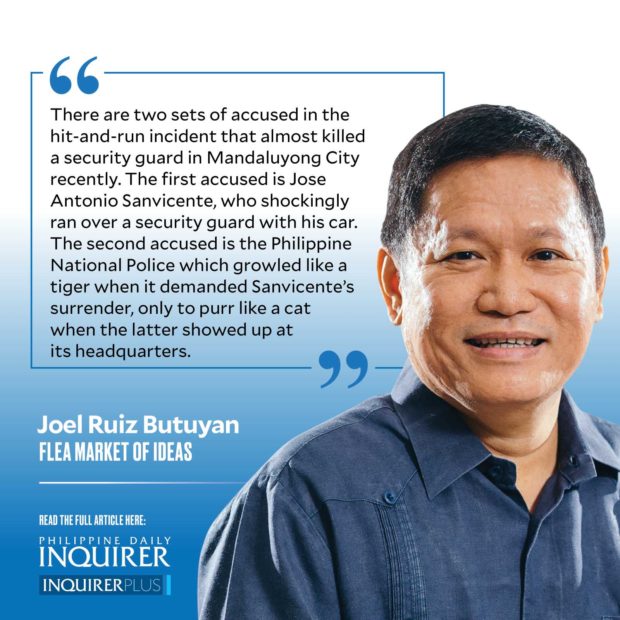There are two sets of accused in the hit-and-run incident that almost killed a security guard in Mandaluyong City recently. The first accused is Jose Antonio Sanvicente, who shockingly ran over a security guard with his car. The second accused is the Philippine National Police (PNP) which growled like a tiger when it demanded Sanvicente’s surrender, only to purr like a cat when the latter showed up at its headquarters.
There are two courts that are involved in the incident. The court of law where Sanvincente will stand trial, and the court of public opinion where both Sanvicente and the PNP have already been swiftly convicted of wrongdoing.
Last June 5, Sanvicente was caught on video committing two horrendous crimes against Christian Joseph Floralde, who was directing traffic at a road intersection. Floralde signaled Sanvicente to stop, but the latter ignored the former by proceeding to make either a U-turn or a left turn. From the video, there was little doubt that Sanvicente saw Floralde because he attempted to swerve to avoid hitting the security guard. Sanvicente miscalculated and bumped Floralde, who then fell to the ground. At this point, Sanvicente committed his first crime of physical injuries through reckless imprudence. Sanvicente has the benefit of the doubt that he was merely grossly negligent, and he didn’t intend to hurt Floralde in this first crime. But things got worse.
Sanvicente knew that he hit Floralde because he stopped for almost five seconds after he bumped him and caused him to fall to the ground. Knowing that an injured person was in front of his car, Sanvicente still charged forward and horribly ran over Floralde. Sanvincente knew he was running over Floralde because his car jerked upward as if hitting a big road hump. For intentionally running over Floralde, Sanvincente committed a second crime of frustrated murder. At that point, Sanvicente was no longer merely reckless. There was the intention to maim and even kill Floralde.
One wonders if Sanvicente was acting on the horrible belief held by many motorists that it’s cheaper to end up with a dead pedestrian instead of a badly injured one, because hospitalization expenses are more expensive than burial costs.
The video of the incident went viral. The public was outraged, especially when Sanvicente refused to surface for 10 days. PNP chief Lt. Gen. Vicente Danao Jr. warned Sanvicente that he could end up a dead “Saint Vicente” if he didn’t surrender.
This convinced Sanvicente to surrender, confess to the crime, and apologize. All these elements (surrender, admission, and apology) caused the warrantless arrest and imprisonment of previous suspects. But not Sanvicente, whose voluntary surrender was rejected by the police.
If we talk about what the law really says, the police were correct in not arresting Sanvicente because there was no warrant for his arrest. He could not also be the subject of a warrantless arrest because the crucial circumstance of hot pursuit was no longer present. A hot pursuit requires that the arresting officer must have personally witnessed facts pointing to the suspect as perpetrator of the crime, and there must be “immediacy” between the time the crime was committed and the time the arrest is made. Both elements were absent in Sanvicente’s case.
But the public was not relying on the letter of the law. Instead, the public was relying on what the police have long led people to believe on what the law allows. In so many previous incidents, the police had effected warrantless arrests by brushing aside the elements of hot pursuit as inconsequential.
So why did the police not arrest Sanvicente, despite his surrender, admission, and apology? Because Sanvicente didn’t possess another element the police considered vital: He was not a poor suspect who had no means of fighting the police.
The police were correct in not arresting Sanvicente. But they ironically failed to prove that there was justice in their action. Instead, the police ended up establishing the illegality of their practice of warrantlessly arresting poor and powerless people. The police proved that wealth is a precondition to one’s entitlement to justice in this poverty-stricken country.
——————
Comments to fleamarketofideas@gmail.com
